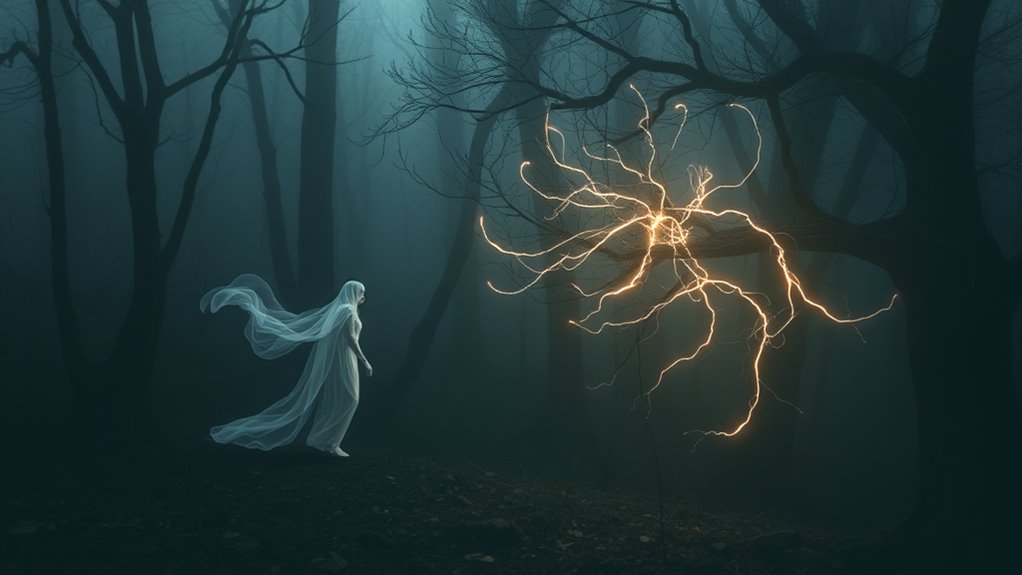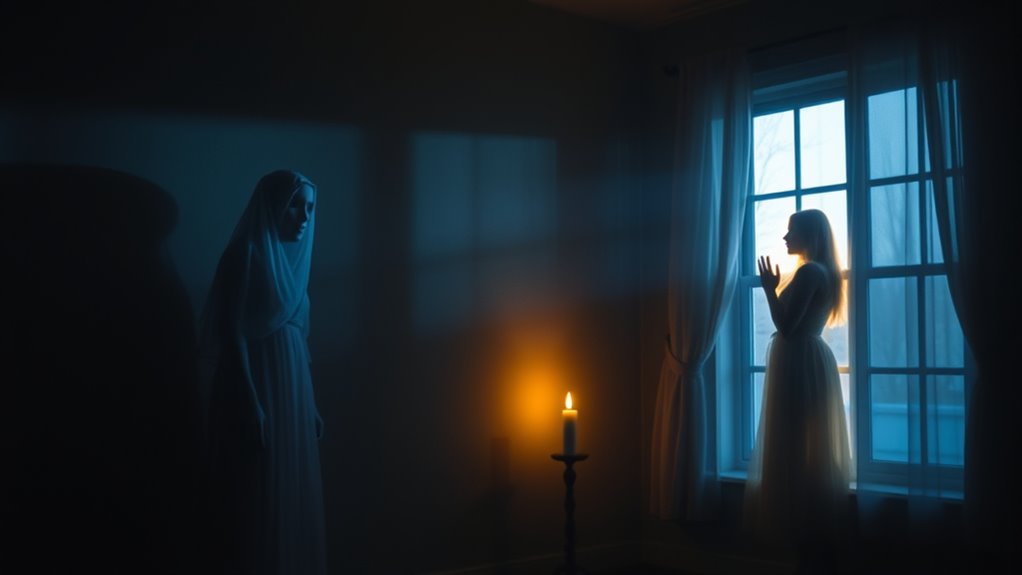Ghosts and spirits are quite different. Ghosts are earth-bound essences tied to unresolved issues or locations where they died, often causing fear or discomfort. They sometimes don’t even realize they’re deceased. On the other hand, spirits are souls that have moved on, offering love and guidance from a higher domain. They communicate through emotional connections and bring comfort. If you’re curious about how these two interact with the living, there’s more to explore.
Key Takeaways
- Ghosts are earth-bound entities tied to locations of death, while spirits have moved on to the upper astral plane.
- Communication with spirits is emotional and supportive, whereas ghosts often exhibit confusing or unsettling behaviors.
- Ghosts may display residual energy and lack awareness of their deceased state, while spirits retain personality and identity.
- Spirits aim to offer love and guidance, while ghosts may create fear or discomfort due to unresolved issues.
- Understanding these differences helps alleviate fears related to ghostly encounters and emphasizes the healing nature of spirits.
Definition of Ghosts

When you think of ghosts, imagine the lingering essence of a person who’s passed away but remains tied to the earthly domain.
Ghosts are often seen as earth-bound spirits of individuals who haven’t crossed over, usually due to sudden or violent deaths. They’re typically anchored to the location of their demise, lingering because of unfinished business or strong emotional ties.
Unlike spirits, which are positive entities that can traverse dimensions, ghosts are remnants of energy reflecting trauma. They might manifest through sounds, smells, or objects moving, showcasing their unresolved issues.
Sometimes, they engage in mischievous activities, seeking recognition from the living. These behaviors highlight their connection to the past, evoking emotions tied to their experiences.
Definition of Spirits

Spirits represent the souls of individuals or animals that have shifted from the physical domain, carrying with them their unique personalities and identities. Unlike ghosts, spirits have moved on from earthly ties and don’t typically have unfinished business. They often visit the living to offer support and guidance, communicating through emotional connections and signs.
| Aspect | Spirits |
|---|---|
| Dimension | Upper Astral Plane |
| Nature | Positive light beings |
| Purpose | Comfort and guidance |
| Interaction | Through love and emotional connections |
In contrast, ghosts may linger due to unresolved issues. Understanding these differences helps you appreciate the distinct roles that ghosts and spirits play in the dimension of the afterlife.
Characteristics of Ghosts

When you think about ghosts, consider how they’re often tied to the places where they died, showing strong earth-bound attachments.
You might notice that they sometimes manifest behaviors linked to unfinished business, trying to communicate or protect something important.
These characteristics highlight their confusion and emotional energy, setting them apart from spirits.
Earth-Bound Attachment
Although many people may not realize it, ghosts often remain tied to the location of their death due to unresolved issues or tragic circumstances. These ghosts may not even be aware they’ve died, leading them to exhibit behaviors that suggest they’ve got unfinished business.
When a ghost experiences a violent death, it can manifest through dark energy, creating an unsettling atmosphere. Unlike spirits, ghosts can resemble psychotic individuals, lacking reasoning capabilities and unable to move on from their earthly attachments.
In fact, only a small percentage of paranormal sightings are true ghostly encounters; most are linked to residual energy rather than individual spirits. Understanding this earth-bound attachment helps clarify the nature of ghosts and their lingering presence.
Unfinished Business Manifestations
Ghosts often manifest their unfinished business in ways that reflect their emotional attachments and unresolved issues. You might notice sounds, smells, or playful occurrences that hint at a ghost’s lingering presence, like Minnie Thomas, who engages with the current owners of her cabin.
These manifestations often stem from trauma or strong personality traits, leading ghosts to act out in mischievous or unsettling ways. They might replay significant events tied to their death, creating residual energy that keeps them anchored to the physical world.
Sometimes, ghosts don’t even realize they’re dead, which can make their behavior seem psychotic as they cling to their earthly attachments. Understanding these manifestations helps you recognize the complexity of a ghost’s unfinished business.
Characteristics of Spirits

When you think about spirits, you’ll notice their positive energies and intentions shine through.
They often seek to connect with you, bringing messages of love and support from beyond. This communication happens in various ways, encouraging you to stay open to their presence and guidance.
Positive Energies and Intentions
Spirits, often viewed as positive light beings, aim to uplift and support their loved ones after death.
Unlike ghosts, which can carry dark energy and unresolved emotions, spirits are filled with love and positive energies and intentions. They retain their personality and identity, fostering connections that encourage healing and comfort.
When you’re open-minded, you may notice signs, symbols, or dreams that indicate a spirit is reaching out to you. This emotional bond enhances their ability to visit and offer support, transcending the limitations that ghosts face, which are often tied to specific locations.
Embracing these interactions can bring peace and reassurance, allowing you to feel the warmth of your loved ones who’ve passed on.
Communication With the Living
Though often overlooked, the connections you share with loved ones who’ve passed can lead to meaningful communication beyond the physical domain.
Unlike ghosts, spirits actively engage in communicating, offering support and encouragement. Here are some ways they reach out to you:
- Dream Visitations: Spirits often visit in dreams, sharing messages and comfort.
- Signs and Symbols: You might notice feathers, specific numbers, or other symbols that hold significance.
- Emotional Connections: The love you shared enhances your ability to connect with them.
- Open-Mindedness: Being receptive allows you to perceive their messages more clearly.
- Encouragement: Spirits aim to provide a sense of comfort, reminding you that they’re still present in your life.
Differences Between Ghosts and Spirits

While many people use the terms “ghost” and “spirit” interchangeably, significant differences set them apart.
A ghost is typically an earth-bound entity, lingering due to unresolved issues or unfinished business, often tied to specific locations. In contrast, spirits are surviving personalities that have moved on and can traverse different dimensions freely.
You might notice that communication with spirits often feels emotional and supportive, while ghosts usually don’t engage, appearing instead as residual energies.
The presence of a spirit can be comforting and uplifting, whereas a ghost may evoke fear or discomfort due to its connection to past traumas.
Ultimately, spirits retain their identity, while ghosts lack personal awareness, remaining tethered to their past experiences.
Emotional Impact of Ghosts and Spirits

When you encounter a spirit, you might feel an overwhelming sense of comfort and connection, as they often bring messages of love and support from the other side.
Encountering a spirit can envelop you in comfort, as they convey love and support from beyond.
In contrast, encounters with ghosts can stir feelings of discomfort or anxiety due to their unresolved energies.
Understanding these emotional impacts can deepen your appreciation of these experiences:
- Spirits foster positive emotional responses and enhance bonds.
- Ghosts may evoke fear tied to past traumas.
- A spirit’s presence typically offers reassurance and support.
- Ghosts create an unsettling atmosphere and provoke unease.
- Recognizing the differences can alleviate fears associated with ghostly encounters.
Frequently Asked Questions
What Is the Difference Between the Spirit and the Holy Ghost?
So, you’re pondering the grand distinction between “spirit” and “Holy Ghost,” huh?
Well, you’ve stumbled upon a delightful theological conundrum! The “Holy Ghost” is like the VIP of the divine club, while “spirit” is the general admission ticket—more inclusive and versatile.
Fundamentally, the Holy Ghost represents a specific divine presence, whereas spirit can refer to a range of ethereal beings, making it a much broader term.
Enjoy your spiritual exploration!
What Does the Bible Say About Ghosts and Spirits?
The Bible addresses ghosts and spirits in various ways. In Matthew 14:26, disciples mistake Jesus for a ghost, highlighting perceptions of apparitions.
Luke 24:39 clarifies that Jesus isn’t a spirit since spirits lack physical form.
The terms “ghost” and “spirit” carry different meanings, with ghosts often seen as negative, while spirits can represent divine entities.
Understanding this distinction helps you gain insight into the biblical perspective on these supernatural phenomena.
What Is the Meaning of Ghost 👻?
A ghost is often seen as the lingering presence of someone who’s passed away. You might encounter them in places tied to their life or death, where unresolved issues keep their energy anchored.
Ghosts typically repeat past actions or display behaviors that hint at their unfinished business. When you feel an unexplained chill or hear strange noises, you could be experiencing the energy of a ghost, reflecting their emotional ties to the physical world.
What Does It Mean When a Spirit Visits You?
When a spirit visits you, it often means you’re experiencing a deep emotional connection. These visitations can happen in dreams, bringing comfort or messages.
You might notice signs like sudden temperature changes or a gentle touch, indicating their presence. Spirits seek to reassure you, offering love and support rather than fear.
Stay open-minded to their communication, as it may be subtle, manifesting through feelings or symbols that remind you of shared memories.
Conclusion
So, whether you’re dodging a ghost that’s clinging to its past or connecting with a spirit soaring through the cosmos, each brings its own wild twist to the afterlife tale! Ghosts might rattle your bones, while spirits could inspire your soul. Embrace the thrill of the unknown—every creak in the night could be a ghostly whisper, or a spirit’s gentle nudge! The supernatural world is a rollercoaster ride you won’t want to miss!









